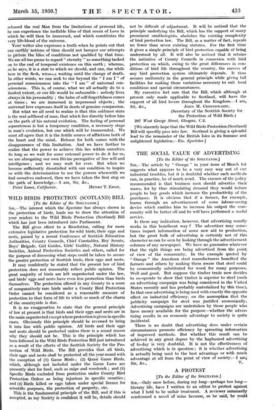WILD BIRDS PROTECTION (SCOTLAND) BILL
' [To the Editor of the SPECTATOR.] Sia,—The interest which the Spectator has always shown in the protection of birds, leads me to draw the attention-of your readerS to the Wild Birds Protection (Scotland) Bill which has just been introduced into Parliament.
The Bill gives effect to a Resolution, calling for more extensive legislative protection for wild -birds; their eggs and nest's, paised by a recent Conference of Scottish Education Authorities, County Councils, Chief Constables, Boy Scouts, Boys' Brigade, Girl duffles, Girls' Guildry, Natural History Societies, Animal Protection Societies and others, called for the purpose of discussing what steps could be taken to secure the greater protection of Scottish birds, their eggs and nests.
It may confidently be stated that the present law of bird
protection does not reasonably reflect public opinion. The great majority of birds are left unprotected under the law, and birds' eggs and nests have even less protection than birds themselves. The protection offered in any County to a score of comparatively rare birds under a County Bird Protection Order cannot be considered as a reasonable measure of protection to that form of life to which so much of the charm of the countryside is due.
It is no exaggeration to state that the general principle
of law at present. is It* birds and their eggs and nests are in the main unprotected except where protection is given in specific cases. Obviously this principle should be reversed to bring it into line with public opinion. All birds and their eggs and nests ,should be protected unless there is a sound reason why they .should _not be. This is the principle which has been followed in the Wild Birds Protection Bill just introduced as a result of the efforts of the Scottish Society_ for the Pro- tection of Wild Birds. The Bill provides that all birds, their eggs and nests shall be protected all the year round with the exception of (1) Game Birds ; (2) Quasi Game Birds, which, although not included under the Gime, Laws are presently shot for food, such as snipe and woodcOck ; and (3) Specific Birds excluded from protection under County Bird Protection Orders as being injurious in specific counties ; and (4) Birds killed or eggs taken under special licence for scientific purposes, the protection of property, etc.
This is the fundamental principle of the Bill, and if this is accepted, as my Society is confident it will be, details should not be difficult of adjustment. It will be noticed that the principle underlying the Bill, which has the support of many prominent ornithologists, abolishes the existing complexity of bird protection law. The Bill, as a matter of fact, repeals no fewer than seven existing statutes. For the first time it gives a simple principle of bird protection capable of being understood by all. It will also be noticed that it retains the initiative of County Councils in connexion with bird protection on which, owing to the great differences in con- ditions of bird life throughout the country, the success of any bird protection system ultimately depends. It thus secures uniformity in the general principle while giving full facilities for making those variations necessary to suit local conditions and special circumstances.
My executive feel sure that the Bill, which although at present only made applicable to Scotland, will have the support of all bird lovers throughout the Kingdom.—I am, (Secretary of the Scottish Society for the Protection of Wild Birds.) 207 West George Street, Glasgow, C.2.
[We sincerely hope that the Wild Birds Protection (Scotland) Bill will speedily pass into law. Scotland is giving a splendid lead to the remainder of the British Isles in its humane and enlightened legislation.—En. Spectator.]




















































 Previous page
Previous page